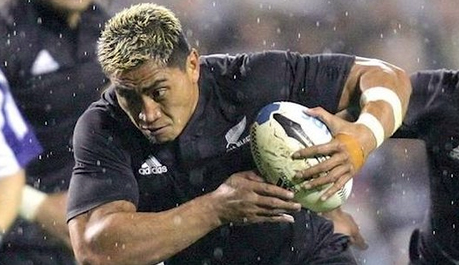

MONTPELLIER, FRANCE – On Saturday, May 31st, 2008, Jerry Collins retired from New Zealand rugby. Today, we are redistributing the beautifully worded retirement piece that I had in a scrapbook from a NZ paper I was reading during a trip there. I can’t remember which one, so forgive the lack of a proper credit. It applies now, tragically, after his death in a car crash. We trust our fan base will appreciate it. A few words from this fan will attempt to serve as a final goodbye to the titan of world rugby that was Jerry Collins.
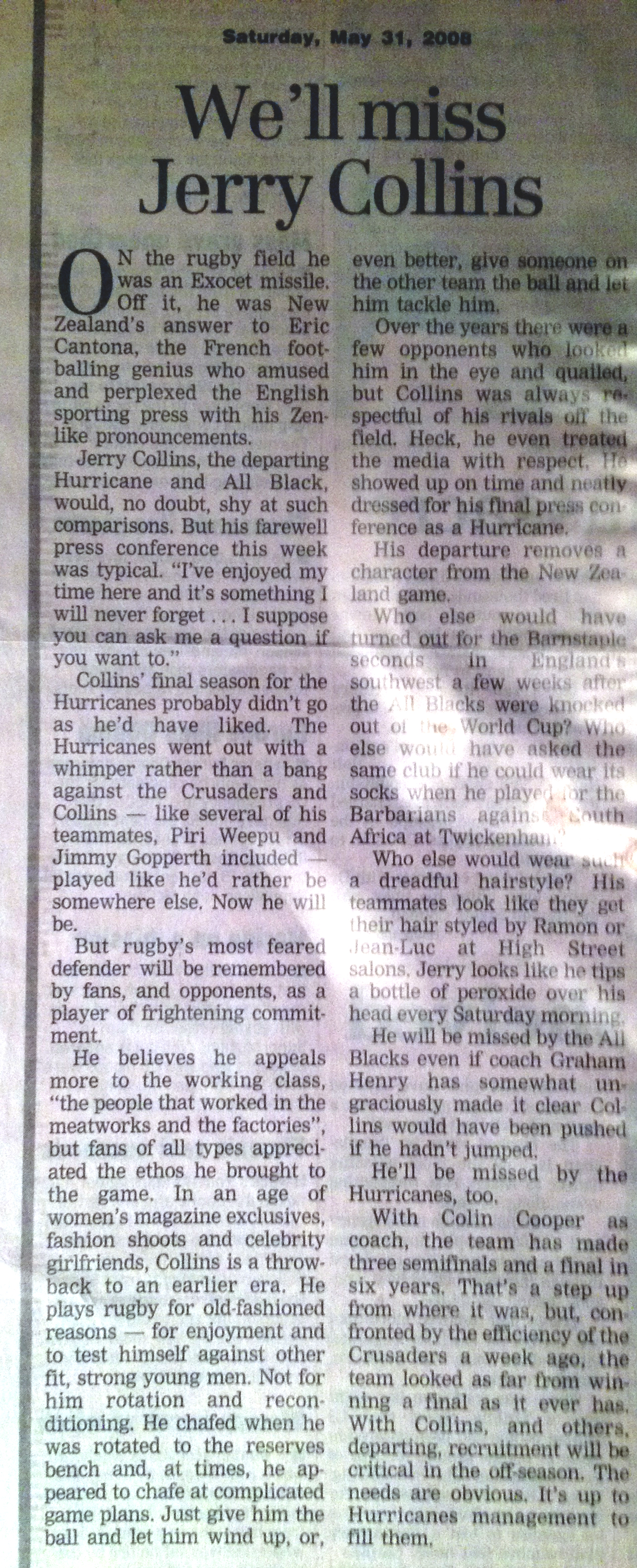 On the rugby field he was an Exocet missile. Off it, he was New Zealand’s answer to Eric Cantona, the French footballing genius who amused and perplexed the English sporting press with his Zen like pronouncements. Jerry Collins, the departing Hurricane and All Black, would, no doubt, shy at such comparisons. But his farewell press conference this week was typical. “I’ve enjoyed my time here and it’s something I will never forget… I suppose you can ask me a question if you want to.” Rugby’s most feared defender will be remembered by fans, and opponents as a player of frightening commitment.
On the rugby field he was an Exocet missile. Off it, he was New Zealand’s answer to Eric Cantona, the French footballing genius who amused and perplexed the English sporting press with his Zen like pronouncements. Jerry Collins, the departing Hurricane and All Black, would, no doubt, shy at such comparisons. But his farewell press conference this week was typical. “I’ve enjoyed my time here and it’s something I will never forget… I suppose you can ask me a question if you want to.” Rugby’s most feared defender will be remembered by fans, and opponents as a player of frightening commitment.
He believes he appeals more to the working class “the people that worked in the meatworks and the factories,” but fans of all types appreciated the ethos he brought to the game. In an age of women’s magazine exclusives, fashion shoots and celebrity girlfriends, Collins is a throwback to an earlier era. He plays rugby for old-fashioned reasons – for enjoyment and to test himself against other fit, strong young men. Not for him the rotation and reconditioning. He chafed when he was rotated to the reserves bench, and at times, he appeared to chafe at complicated game plans. Just give him the ball and let him wind up, or, even better, give someone on the other team the ball and let him tackle him.
Over the years there were a few opponents who looked him in the eye and quailed, but Collins was always respectful off the field. Heck, he even treated the media with respect. He showed up on time and neatly dressed for his final press conference as a Hurricane. His departure removes a character from the New Zealand game. Who else would have turned out for the Barnstaple seconds in England’s southwest a few weeks after the All Blacks were knocked out of the World Cup? Who else would have asked the same club if he could wear its socks when he played for the Barbarians against South Africa at Twickenham? Who else would wear such a dreadful hairstyle? His teammates look like they get their hair styled by Ramon or Jean-Luc at High street salons. Jerry looks like he tips a bottle of peroxide over his head every Saturday morning. He will be missed by the All Blacks and he’ll be missed by the Hurricanes too.
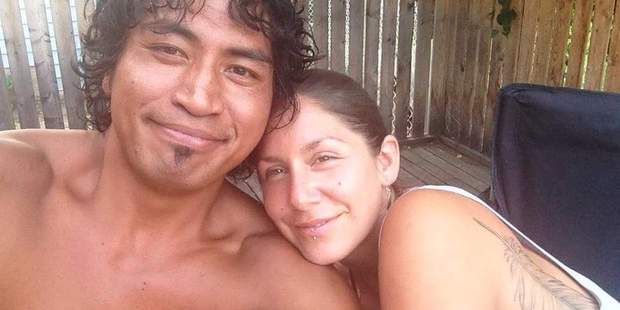
Here the article ends and my thoughts begin.
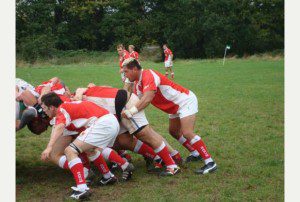
Jerry Collins was indeed a throwback, yet at the same time he was the consummate professional. All of the great stories about Collins come from outside the professional sphere. His brief cameo for Barnstaple 2nd XV was noted by the rugby world with awe, and
written about with glee by rugby writers the world over. It was noted that Collins did not simply turn up and smash everybody to pieces. In fact, he was asked to play and on finding out he could not be registered to play for the first team, said he was not bothered who he played for – as long as he got to play. He borrowed a pair of boots and socks and turned out for the 2nd XV. Being the ultimate professional, Jerry realized his competition and the story goes that he spent the entire game going at half pace, allowing his team and everyone on the pitch to enjoy themselves… playing alongside and against an All Black. The only time he really felt the need to tackle somebody in his own inimitable style was when it required a try-saving tackle.
Some will claim the ultimate professional should have gone full blast in
such a game as a perfect professional should. But true rugby purists will understand exactly what Collins did. He knew the caliber of his opponent and rather than run roughshod over them, he simply allowed himself to relax and enjoy the game, knowing he had the ability to wreck everything around him – but choosing not to. A study in humility and awareness. When one of his teammates got injured on the pit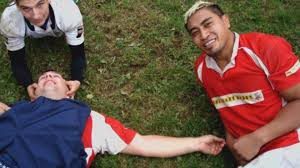 ch, he asked Jerry for a picture – just in case he had to go to hospital and missed the All Blacks leaving. The famous photo shows a smiling Collins lying down on the ground next to a man who is in the safety position after having sustained a nasty head knock. Pure class. When told he might face a fine for turning out for Barnstaple, Collins replied that it would be worth every dollar.
ch, he asked Jerry for a picture – just in case he had to go to hospital and missed the All Blacks leaving. The famous photo shows a smiling Collins lying down on the ground next to a man who is in the safety position after having sustained a nasty head knock. Pure class. When told he might face a fine for turning out for Barnstaple, Collins replied that it would be worth every dollar.
And what of the ‘Hitman’ in New Zealand colours? Again he transcended the boundary between the amateur and professional eras. At the start of his career Collins was simply a big-hitting, big-carrying blindside flanker. Yet today, the blindside flanker is seen as somebody who has to be as adept at ball handling as a fly half, and as dedicated in defence as anybody else on the pitch. Flankers are the all-singing, all-dancing men on the rugby pitch. Collins transformed himself from the early incarnation of the Number 6 jersey to what we see in its most recent form. In the later years of his career, he became a much more impressive ball player, with beautiful offloads and intelligent line running. A strong case can be made that he was the first of the modern day blindside flankers we see today, and yet he was also the best of the old school run-and-hit flankers of yesteryear.
https://www.youtube.com/watch?v=MqNs8DuRrng
I wrote this article because to me there was nobody better than Jerry Collins as a rugby player, and judging by the stories, as a personality off the pitch. He will forever be in my starting XV in the Number 6 jersey. Nobody comes close to what he brought to the pitch; the drive and determination, the power, and above all else – the desire to quietly go around destroying the reputations of other allegedly powerful rugby players (Sebastian Chabal are you listening?).
And so with tears in our eyes we say, goodbye Jerry. You were and always will be the best, a professional who never forgot the roots of his sport.

